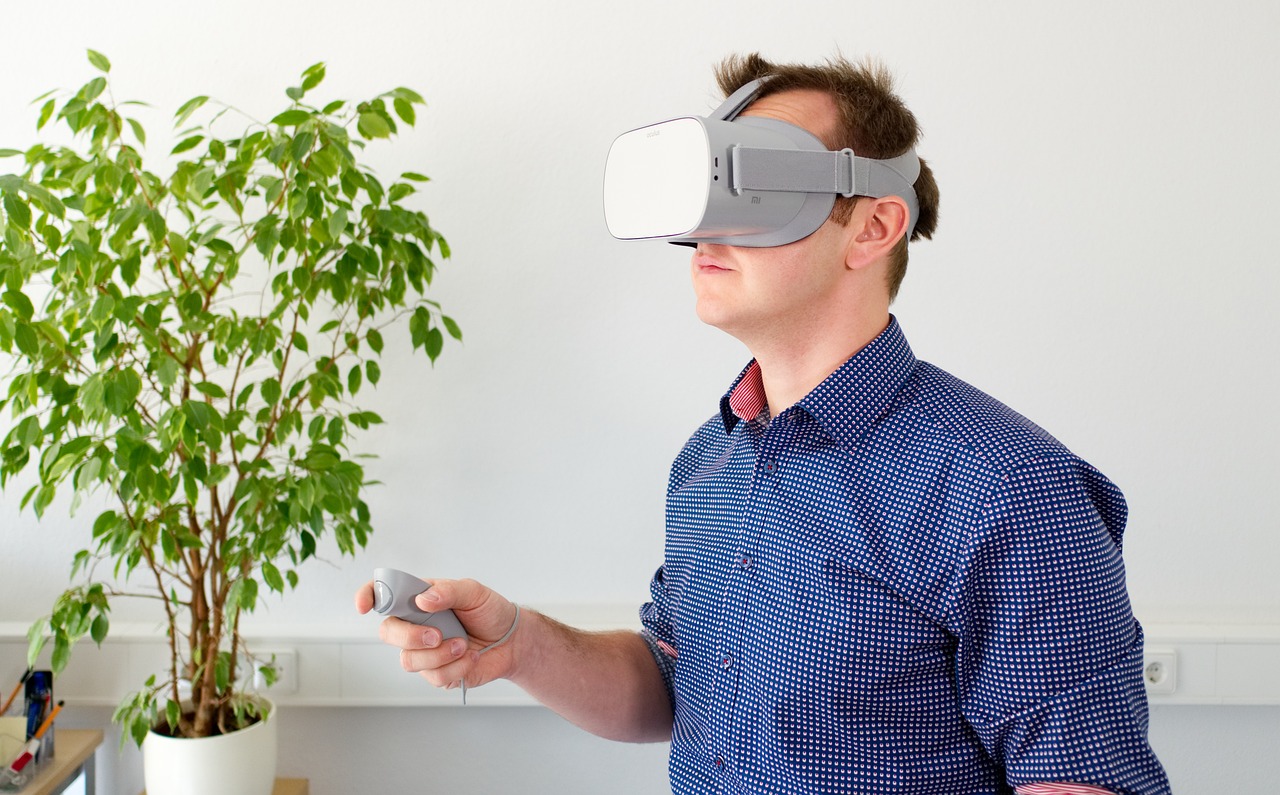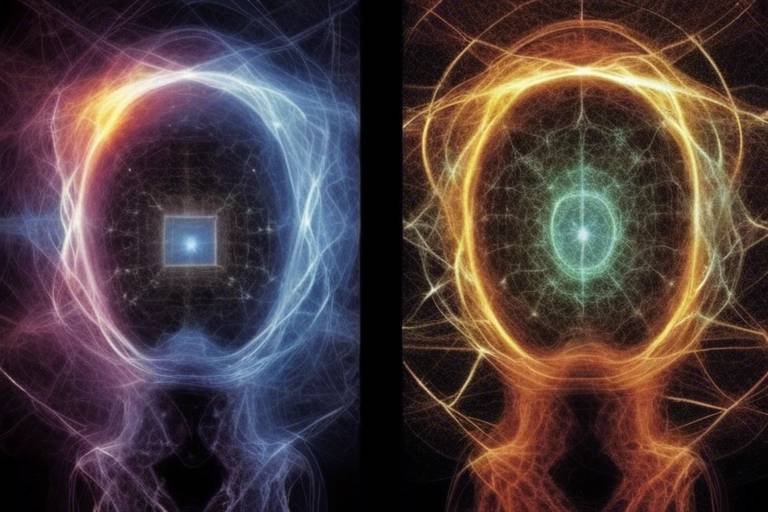The Relationship Between Ontology and Phenomenology
In the vast landscape of philosophy, two disciplines stand out for their profound exploration of existence and experience: ontology and phenomenology. While they may seem distinct at first glance, a closer examination reveals a rich tapestry of interconnections that enhance our understanding of reality. Imagine standing at the crossroads of these two philosophical paths, where questions of what it means to be and how we perceive that being converge. This article will unravel these intricate relationships, shedding light on how ontology and phenomenology not only influence each other but also contribute significantly to our grasp of existence.
Ontology, with its roots in ancient philosophical thought, asks the fundamental question: "What is there?" It delves into the nature of being, existence, and the categories of things that populate our reality. On the other hand, phenomenology shifts the focus to our experiences and perceptions, asking, "How do we experience what is?" This interplay creates a dynamic dialogue between the two fields, where the essence of existence (ontology) informs the structures of our consciousness (phenomenology) and vice versa.
By examining these relationships, we not only gain insights into the nature of reality but also into the very fabric of human experience. Consider this: if ontology lays the groundwork for understanding existence, phenomenology provides the lens through which we interpret that existence. As we navigate through this article, we will explore the fundamental concepts of both disciplines, their historical contexts, and the modern implications of their intersection. So, buckle up as we embark on this philosophical journey that promises to be as enlightening as it is thought-provoking!
- What is ontology? Ontology is the branch of philosophy that studies the nature of being, existence, and the categories of things.
- What is phenomenology? Phenomenology focuses on the structures of experience and consciousness, exploring how we perceive and understand the world.
- How do ontology and phenomenology intersect? Both disciplines address fundamental questions about reality and perception, enriching our understanding of existence and experience.
- Who are some key figures in ontology? Influential philosophers include Aristotle, Martin Heidegger, and W.V.O. Quine, each contributing unique perspectives on existence.
- What are the implications of their relationship for contemporary philosophy? The interplay between ontology and phenomenology influences modern philosophical discourse, shaping current debates in various fields.

Understanding Ontology
Ontology, at its core, is the philosophical study of being and existence. It asks the big questions: What does it mean to exist? What kinds of things exist in the universe? This branch of philosophy dives deep into the nature of reality, exploring not just the physical world but also abstract concepts like time, space, and even the essence of ideas. Imagine ontology as a grand map of existence, where every entity, whether tangible or intangible, is plotted out in relation to each other. This map helps us navigate the complexities of reality, guiding our understanding of everything from objects we can see and touch to ideas that linger in our minds.
One of the fundamental concepts in ontology is the distinction between being and becoming. While being refers to the state of existence itself, becoming encompasses the processes and changes that entities undergo. Think of a butterfly: it exists as a caterpillar, then transforms into a chrysalis, and finally emerges as a beautiful butterfly. Each stage of its life represents a different aspect of existence, highlighting how ontology seeks to understand not just what is, but how things come to be. This distinction is crucial as it opens up discussions about permanence versus change, a theme that resonates throughout various philosophical debates.
Ontology also delves into the categorization of existence. Philosophers often classify entities into different categories, which can include:
- Concrete objects - things that exist in the physical world, like trees, cars, and people.
- Abstract entities - concepts such as numbers, properties, and ideas that do not have a physical presence.
- Possible worlds - hypothetical scenarios that explore different ways reality could have unfolded.
This classification helps in understanding how different entities interact and relate to one another. For instance, when we consider a tree, we can think about its physical properties (concrete), its role in an ecosystem (relationship with other entities), and even its symbolic meaning in various cultures (abstract). Such an exploration shows how ontology is not just about what exists, but also about the interconnections that define existence itself.
In modern discussions, ontology has expanded beyond traditional philosophical boundaries. With advancements in science and technology, ontological inquiries now intersect with fields like artificial intelligence, where questions about the nature of consciousness and the existence of digital entities arise. For example, if we create an AI that can mimic human behavior, does it possess a form of existence? What does that mean for our understanding of consciousness? These questions illustrate how ontology remains a vibrant and evolving discipline, constantly adapting to new discoveries and societal changes.
In summary, ontology provides a foundational framework for understanding existence. It challenges us to think critically about what it means to be and how various entities relate to one another. As we continue to explore these questions, ontology not only enriches our philosophical discourse but also enhances our comprehension of the world around us.

Exploring Phenomenology
Phenomenology is a fascinating branch of philosophy that delves deeply into the structures of experience and consciousness. At its core, it seeks to understand how we perceive the world around us, focusing not merely on the objects of our perception but also on the processes and contexts that shape our experiences. Imagine walking through a vibrant forest; the colors, sounds, and scents do not just exist in isolation. They come together to create a rich tapestry of experience that is uniquely yours. This is the essence of phenomenology—it emphasizes the subjective experience and the meanings we derive from our interactions with the world.
One of the central figures in phenomenology, Edmund Husserl, introduced the concept of "intentionality," which posits that consciousness is always directed towards something. This means that our thoughts, feelings, and perceptions are always about objects or experiences in the world. For instance, when you think about your favorite book, your consciousness is not just floating aimlessly; it is focused on the narrative, the characters, and the emotions that the book evokes within you. This intentionality is crucial for understanding how we engage with reality.
Another key thinker, Maurice Merleau-Ponty, expanded on Husserl's ideas by emphasizing the embodied nature of perception. He argued that our bodies are not merely vessels but integral to how we experience the world. Think of it this way: when you touch a warm cup of coffee, it’s not just a sensory input; it’s an experience that involves your entire being. Your body, your emotions, and your thoughts intertwine to create a holistic understanding of that moment. This embodied perspective invites us to reconsider how we relate to our surroundings and the significance of our physical presence in the act of perceiving.
The methodology of phenomenology often involves a process called bracketing, where one sets aside preconceived notions and biases to engage with experiences more authentically. This requires a certain level of introspection and openness, as individuals are encouraged to reflect on their experiences without the interference of external judgments or scientific explanations. It’s akin to peeling back the layers of an onion, revealing the core of the experience without the distractions of societal norms or expectations.
In phenomenology, the emphasis on first-person experience leads to rich qualitative insights that can be transformative. By exploring how individuals interpret their lived experiences, phenomenologists can uncover the underlying structures that shape human consciousness. This approach has significant implications not just in philosophy but also in fields like psychology, sociology, and even art. For example, artists often draw upon phenomenological principles to evoke emotions and convey experiences that resonate deeply with their audiences.
In summary, phenomenology invites us to explore the depths of human experience, urging us to consider how our perceptions shape our understanding of reality. It challenges us to engage with the world more mindfully, recognizing that our experiences are not just passive observations but active interpretations of existence. As we navigate through life, phenomenology encourages us to appreciate the richness of our experiences and the profound connections we forge with the world around us.
- What is phenomenology? Phenomenology is a philosophical approach that studies the structures of experience and consciousness, focusing on how we perceive and interpret the world.
- Who are the key figures in phenomenology? Notable philosophers include Edmund Husserl, who introduced the concept of intentionality, and Maurice Merleau-Ponty, who emphasized the embodied nature of perception.
- How does phenomenology differ from other philosophical approaches? Unlike other approaches that may prioritize objective analysis, phenomenology emphasizes subjective experience and the meanings derived from it.
- What are the applications of phenomenology? Phenomenology has applications in psychology, sociology, art, and various other fields, providing insights into human experience and perception.

The Historical Context of Ontology
Ontology, as a branch of philosophy, has a rich and complex historical context that traces back to ancient civilizations. Its evolution is marked by significant philosophical movements and key thinkers who have shaped our understanding of existence. In the early days, ontology was closely intertwined with metaphysics, where philosophers sought to understand the nature of reality and the fundamental categories of being. Thinkers like Plato and Aristotle laid the groundwork for ontology, with Plato's theory of forms proposing that non-material abstract forms represent the most accurate reality, while Aristotle focused on the categorization of beings in his work, Categories.
As we move through history, the medieval period saw the rise of scholasticism, where philosophers like Thomas Aquinas integrated Aristotelian ontology with Christian theology. This fusion created a new understanding of existence that emphasized the relationship between God and being. The Renaissance brought about a renewed interest in human experience and the material world, which influenced ontological discussions significantly. Thinkers began to challenge the previously dominant notions of being, leading to a more empirical approach to ontology.
The Enlightenment marked another pivotal moment, with philosophers such as Descartes and Leibniz exploring the nature of existence through the lens of reason and rationalism. Descartes famously declared, "I think, therefore I am," emphasizing the role of consciousness in understanding being. This period also saw the emergence of modern philosophy, where ontology began to diverge from metaphysics, focusing more on the structures of being rather than abstract forms.
In the 20th century, ontology underwent a transformation with the rise of existentialism and phenomenology. Thinkers like Martin Heidegger redefined ontology by exploring the concept of 'Being' itself, rather than merely categorizing beings. His work in Being and Time emphasized the importance of human existence and experience, marking a significant shift in ontological discourse.
Throughout its history, ontology has been influenced by various disciplines, including science and technology. As our understanding of the universe has evolved, so too has the ontological framework. Today, ontology is not only a philosophical inquiry but also intersects with fields like computer science, where ontological models are used to organize information and improve artificial intelligence systems.
The historical context of ontology reveals a dynamic and evolving field that has continually adapted to new ideas and societal changes. As we explore the interplay between ontology and phenomenology, it becomes clear that understanding the historical development of these disciplines enriches our comprehension of human existence and experience.

Major Figures in Ontology
Ontology, as a crucial branch of philosophy, has been shaped by the thoughts and theories of several influential figures throughout history. These philosophers have not only defined the discipline but have also challenged and expanded our understanding of existence and being. Let’s take a closer look at some of the major figures who have left an indelible mark on ontology.
One cannot discuss ontology without mentioning Aristotle. Often referred to as the father of Western philosophy, Aristotle's contributions laid the groundwork for much of what we understand about being. His concept of substance is particularly notable; he argued that substances are the fundamental realities that exist independently of our perceptions. Aristotle's work in his text, Metaphysics, explores the nature of reality and categorizes different types of beings, establishing a framework that has influenced countless thinkers.
Another pivotal figure is Martin Heidegger, whose existential approach to ontology redefined the discipline in the 20th century. In his seminal work Being and Time, Heidegger introduced the idea of 'being-in-the-world,' emphasizing that our understanding of existence is deeply intertwined with our experiences and interactions. His exploration of 'Dasein', or human existence, challenges us to consider how our being is shaped by our temporal and spatial realities. Heidegger’s work invites us to reflect on the question of what it means to be, pushing the boundaries of traditional ontology.
Then we have Willard Van Orman Quine, a philosopher who questioned the very foundations of ontology. In his essay "On What There Is," Quine famously argued against the distinction between analytic and synthetic truths, suggesting that our understanding of existence is not only a matter of logical reasoning but also of empirical science. His holistic approach to knowledge posits that our ontology should be informed by our best scientific theories, thus bridging the gap between philosophy and science.
These thinkers represent just a few of the many voices that have contributed to the rich tapestry of ontology. Their ideas not only reflect the evolution of philosophical thought but also serve as a foundation for contemporary debates. To better understand their contributions, we can summarize their key ideas in the following table:
| Philosopher | Key Contribution | Notable Work |
|---|---|---|
| Aristotle | Concept of Substance | Metaphysics |
| Martin Heidegger | 'Being-in-the-world' and Dasein | Being and Time |
| Willard Van Orman Quine | Holistic Approach to Ontology | On What There Is |
In conclusion, the contributions of these major figures in ontology not only provide a historical context but also invite us to engage with the fundamental questions surrounding existence. Their diverse perspectives challenge us to think critically about what it means to be and how we understand our reality. As we delve deeper into the relationship between ontology and phenomenology, the influence of these philosophers will undoubtedly continue to resonate.
- What is ontology? Ontology is the branch of philosophy that studies the nature of being, existence, and reality.
- Who is the father of ontology? Aristotle is often considered the father of ontology due to his foundational work in the field.
- How does Heidegger's concept of Dasein influence ontology? Heidegger's concept of Dasein emphasizes the importance of human experience and existence in understanding being.

Ontology in Modern Philosophy
In the landscape of modern philosophy, ontology has undergone a profound transformation, adapting to the complexities of contemporary thought and the advancements in various scientific fields. No longer confined to the abstract musings of ancient philosophers, modern ontology actively engages with disciplines such as science, technology, and even artificial intelligence. This evolution is not just a shift in focus but a redefinition of what it means to exist in an increasingly complex world.
One of the most significant developments in modern ontology is the incorporation of insights from quantum physics and cognitive science. These fields challenge traditional notions of reality, pushing philosophers to reconsider the nature of existence itself. For instance, the idea that particles can exist in multiple states until observed has sparked debates about the role of consciousness in shaping reality. This leads us to ask: Is reality something that exists independently of our perception, or is it co-created through our experiences?
Moreover, modern ontology embraces a more interdisciplinary approach. Philosophers today often collaborate with scientists and technologists to explore questions of existence in the digital age. The emergence of virtual realities and artificial intelligence raises intriguing ontological questions. For example, can a digital entity possess a form of existence comparable to that of a human being? This inquiry not only challenges our understanding of being but also invites us to reconsider the ethical implications of our technological creations.
Another pivotal aspect of modern ontology is its engagement with social and political issues. Contemporary philosophers are increasingly aware that questions of existence cannot be divorced from the contexts in which they arise. This has led to the development of ontologies that consider factors such as race, gender, and environmental concerns. By understanding existence through these lenses, philosophers aim to create a more inclusive and comprehensive framework for discussing what it means to be.
To illustrate the current state of ontology, we can look at a few key themes that have emerged in recent discussions:
- Relational Ontology: This perspective emphasizes the interconnectedness of beings, suggesting that existence is defined by relationships rather than isolated entities.
- Process Ontology: This view posits that becoming is more fundamental than being, focusing on the dynamic nature of existence.
- Posthumanism: This movement challenges anthropocentric views of existence, exploring what it means to exist in a world where human beings are not the central focus.
In summary, ontology in modern philosophy is a vibrant and evolving field that reflects the complexities of our contemporary world. By integrating insights from various disciplines and addressing pressing social issues, modern ontologists are redefining our understanding of existence. As we continue to grapple with these profound questions, it becomes clear that ontology is not just an abstract theory but a vital part of our quest to understand the very fabric of reality itself.
- What is ontology? Ontology is the branch of philosophy that studies the nature of being, existence, and reality.
- How does modern ontology differ from traditional ontology? Modern ontology incorporates insights from various scientific fields and addresses contemporary social issues, whereas traditional ontology focused primarily on abstract concepts of existence.
- What role does technology play in modern ontology? Technology challenges traditional notions of existence and prompts new questions about the nature of digital entities and their relationship to human beings.
- Why is interdisciplinary collaboration important in ontology? Interdisciplinary collaboration enriches ontological discussions by integrating diverse perspectives and methodologies, leading to a more comprehensive understanding of existence.

The Roots of Phenomenology
To truly grasp the essence of phenomenology, we must journey back to its philosophical origins, primarily rooted in the works of two monumental figures: Edmund Husserl and Maurice Merleau-Ponty. These philosophers laid the groundwork for a movement that would profoundly influence our understanding of experience and consciousness. At its core, phenomenology seeks to explore the structures of experience from a first-person perspective, emphasizing how we perceive and interpret the world around us.
Husserl, often regarded as the father of phenomenology, introduced the concept of intentionality, which posits that consciousness is always directed towards something. This means that our thoughts, perceptions, and experiences are not isolated; they are always about something—an object, a feeling, or an idea. By focusing on this intentionality, Husserl aimed to peel back the layers of our experiences to reveal their fundamental structures. He believed that by bracketing our preconceived notions and biases, we could access the pure essence of our experiences, a process he termed epoché.
On the other hand, Merleau-Ponty expanded upon Husserl's ideas by emphasizing the role of the body in shaping our perception. He argued that our bodily existence is crucial to how we experience the world, positing that we are not merely minds inhabiting bodies but rather embodied beings whose perception is inherently tied to our physical presence. This notion of embodiment is vital in understanding how we interact with our environment, as it highlights the interconnectedness of perception, action, and the world around us.
In essence, the roots of phenomenology lie in a profound inquiry into the nature of experience itself. It challenges us to consider how our perceptions shape our understanding of reality. This philosophical approach invites us to reflect on our everyday experiences, revealing how our consciousness is intricately woven into the fabric of our existence. By examining these foundational ideas, we can appreciate how phenomenology offers a unique lens through which to view the complexities of human experience.
As we delve deeper into the intersection of ontology and phenomenology, it becomes evident that these disciplines, while distinct, share a common goal: to illuminate the nature of existence and our place within it. This exploration not only enriches our philosophical understanding but also enhances our appreciation for the intricate tapestry of life itself.
- What is phenomenology? Phenomenology is a philosophical approach that studies the structures of experience and consciousness, focusing on how we perceive and interpret the world.
- Who are the key figures in phenomenology? The primary figures in phenomenology include Edmund Husserl, who is considered the founder, and Maurice Merleau-Ponty, who emphasized the importance of embodiment in perception.
- How does phenomenology relate to ontology? Phenomenology and ontology intersect in their exploration of existence and experience, with phenomenology focusing on perception and consciousness while ontology examines the nature of being.

The Intersection of Ontology and Phenomenology
When we dive into the fascinating realm of ontology and phenomenology, we find ourselves at a crossroads where existence meets experience. These two philosophical disciplines, while distinct, share a rich tapestry of themes that interweave to enhance our understanding of what it means to be and to perceive. Imagine standing in a vast field, where ontology represents the solid ground beneath your feet—firm, stable, and real—while phenomenology is the gentle breeze that brushes against your skin, shaping your sensory experience of that very field. Together, they create a holistic picture of reality that is both profound and enlightening.
At their core, both ontology and phenomenology grapple with fundamental questions about reality. Ontology seeks to answer the "what" of existence: What is there? What does it mean to exist? In contrast, phenomenology focuses on the "how": How do we experience the world around us? How does consciousness interact with objects and events? These inquiries, while different in approach, are deeply interconnected. For instance, consider how our understanding of existence is often shaped by our experiences. The way we perceive our surroundings can influence our beliefs about what exists. This interplay raises intriguing questions: Can we truly understand existence without examining our experiences? Or do our experiences shape our very notions of reality?
One of the most compelling aspects of the intersection between ontology and phenomenology is their shared emphasis on human experience. Both disciplines acknowledge that our perceptions are not merely passive reflections of the world but active engagements that shape our understanding. This leads us to the concept of intentionality, a central tenet of phenomenology, which posits that consciousness is always directed towards something. In other words, when we experience something, we are not just observing; we are interpreting, understanding, and relating to it. This perspective challenges the ontological assumption that existence can be understood independently of our experiences.
Moreover, the intersection of these fields has profound implications for contemporary philosophy. As we navigate issues such as identity, existentialism, and social constructs, the combined insights from ontology and phenomenology provide a richer framework for understanding human existence. For example, when discussing identity, one must consider both the ontological aspects of what constitutes a person and the phenomenological aspects of how individuals experience their identities in various contexts. This dual approach can lead to a more nuanced understanding of complex issues, allowing for a dialogue that respects both the nature of being and the richness of human experience.
In summary, the intersection of ontology and phenomenology is not just a philosophical curiosity; it is a vital area of inquiry that enhances our grasp of existence and experience. By exploring how these disciplines inform and enrich one another, we gain deeper insights into the nature of reality and our place within it. As we continue to engage with these ideas, we are reminded that philosophy is not merely an abstract pursuit but a deeply personal journey that shapes our understanding of the world and ourselves.
- What is the main difference between ontology and phenomenology?
Ontology focuses on the nature of being and existence, while phenomenology examines the structures of experience and consciousness. - How do ontology and phenomenology influence each other?
The two disciplines intersect in their exploration of reality and perception, with phenomenology providing insights into how we experience existence. - Why is the intersection of these fields important?
Understanding their relationship can lead to a more comprehensive view of human existence and experience, enriching contemporary philosophical discussions.

Shared Themes and Concepts
When we dive into the intricate worlds of ontology and phenomenology, we quickly realize that both disciplines, while distinct, share some profound themes and concepts that illuminate our understanding of existence and experience. At their core, both philosophies grapple with the fundamental question of what it means to be. This question isn’t just academic; it resonates deeply with our everyday lives and experiences. For instance, consider how we perceive reality. Ontology seeks to define what exists, while phenomenology investigates how we experience that existence. This interplay creates a rich tapestry of understanding that is essential for grasping the complexities of human life.
One of the most significant shared themes is the concept of intentionality. In phenomenology, intentionality refers to the idea that consciousness is always directed toward something—it is about something. This idea is crucial because it highlights how our experiences are not isolated but are always connected to the world around us. Ontologists, on the other hand, are interested in the nature of the entities that populate this world. They ponder questions like: What does it mean for something to exist? What are the fundamental categories of being? When we look at these questions through the lens of intentionality, we see that our understanding of existence is inherently tied to our experiences of it.
Another shared concept is the importance of context. Both ontology and phenomenology emphasize that understanding cannot be divorced from the context in which it arises. For instance, an object’s existence might be perceived differently depending on the cultural, historical, or personal context of the observer. This idea challenges the notion of objective reality, suggesting instead that our understanding of what is real is mediated by our experiences. To illustrate this, consider a simple object, like a chair. To an ontologist, the chair exists as a physical entity with certain properties. However, to a phenomenologist, the chair is not just a chair; it is an invitation to sit, a place of comfort, or even a barrier in a crowded room. Thus, the chair's meaning and significance are deeply rooted in our interactions with it.
Moreover, both disciplines explore the nature of time and space. In ontology, questions about the nature of time and space are crucial for understanding the framework within which existence occurs. Is time linear or cyclical? Is space absolute or relational? These questions are foundational to how we categorize and understand the world. Conversely, phenomenology examines how we experience time and space. For example, our perception of time can stretch or contract depending on our experiences—an hour spent in joy can feel fleeting, while an hour of boredom can feel interminable. This subjective experience of time challenges the ontological assumptions about its objective nature.
In summary, the intersection of ontology and phenomenology reveals a rich landscape of shared themes that deepen our understanding of existence. By examining concepts like intentionality, context, and the nature of time and space, we uncover the profound ways in which these two philosophical approaches complement and enhance each other. This synergy not only enriches philosophical discourse but also offers valuable insights into our everyday experiences, reminding us that the journey of understanding is as significant as the destination itself.
- What is the main difference between ontology and phenomenology?
Ontology focuses on the nature of being and existence, while phenomenology examines the structures of experience and consciousness. - How do these two disciplines influence each other?
Ontology provides a framework for understanding what exists, while phenomenology offers insight into how we experience that existence, creating a dialogue between the two. - Why is intentionality important in both fields?
Intentionality emphasizes that consciousness is always directed toward something, highlighting the interconnectedness of our experiences and the entities in the world.

Implications for Contemporary Philosophy
The interplay between ontology and phenomenology offers profound implications for contemporary philosophy, shaping our understanding of existence and experience in ways that resonate deeply in various fields. At its core, the relationship between these two disciplines challenges us to reconsider the nature of reality itself. For instance, while ontology asks, "What is there?" phenomenology probes, "How do we experience what is there?" This dual inquiry forms a rich tapestry that influences not just philosophical thought but also practical applications in psychology, cognitive science, and even artificial intelligence.
One of the most significant implications is the shift towards a more integrated approach in philosophical inquiry. Traditionally, ontology has been viewed as a more abstract and theoretical discipline, while phenomenology has focused on the lived experience. However, contemporary philosophers are increasingly recognizing that these areas are not mutually exclusive. Rather, they complement each other in understanding the complexities of human existence. This realization has led to a more holistic view of reality, where subjective experience and objective existence are seen as intertwined.
Moreover, this intersection has sparked debates about the nature of consciousness and its implications for fields such as cognitive science. As researchers explore how consciousness shapes our understanding of reality, the insights from both ontology and phenomenology become crucial. For example, consider the following table that illustrates how various philosophical perspectives contribute to our understanding of consciousness:
| Philosopher | Ontology Perspective | Phenomenology Perspective |
|---|---|---|
| Husserl | Focus on the essence of being | Experience as the foundation of knowledge |
| Heidegger | Being as relational and contextual | Understanding through lived experience |
| Merleau-Ponty | Embodied existence | Perception as the primary mode of engagement with the world |
In addition, the implications extend to ethical considerations in modern society. As we grapple with issues like artificial intelligence and virtual reality, the questions of what it means to exist and experience become more pressing. The fusion of ontology and phenomenology encourages us to examine the ethical ramifications of creating beings that can experience the world, even if their existence is fundamentally different from human beings. This ethical discourse is vital as we navigate the complexities of technology and its impact on our understanding of consciousness and existence.
Furthermore, the dialogue between ontology and phenomenology is enriching contemporary debates in existentialism and post-structuralism. These movements challenge traditional notions of fixed meanings and emphasize fluidity in understanding human experience. By engaging with both ontological and phenomenological perspectives, philosophers can address the nuances of identity, culture, and social constructs in a more profound way. This engagement fosters a deeper appreciation for the diversity of human experience and the myriad ways individuals relate to the world around them.
In conclusion, the implications of the relationship between ontology and phenomenology are vast and varied, influencing not only philosophical discourse but also practical applications in numerous fields. As we continue to explore these connections, we open ourselves to new ways of understanding existence, experience, and the ethical dimensions of our rapidly evolving world. The ongoing dialogue between these two disciplines promises to reveal even more insights into the nature of reality and our place within it.
- What is the primary focus of ontology? Ontology primarily focuses on the nature of being and existence, exploring what entities exist and their relationships.
- How does phenomenology differ from ontology? Phenomenology emphasizes the structures of experience and consciousness, focusing on how individuals perceive and interpret their experiences.
- Why is the relationship between ontology and phenomenology important? Their relationship is important because it offers a more comprehensive understanding of reality, bridging the gap between abstract existence and lived experience.
- How do these disciplines influence modern philosophy? They influence modern philosophy by integrating insights from various fields, encouraging a holistic approach to understanding human existence and consciousness.
Frequently Asked Questions
- What is ontology?
Ontology is the branch of philosophy that studies the nature of being, existence, and reality. It seeks to understand what entities exist, how they can be categorized, and the relationships between them. Think of it as the framework that helps us make sense of everything around us.
- How does phenomenology differ from ontology?
While ontology focuses on the nature of being, phenomenology is concerned with the structures of experience and consciousness. Phenomenology examines how we perceive and interpret the world, emphasizing subjective experiences. Imagine ontology as the map of existence, while phenomenology is the journey of experiencing that map.
- Can you explain the relationship between ontology and phenomenology?
Ontology and phenomenology are deeply interconnected. They both address fundamental questions about existence and perception. Ontology provides the foundational concepts of what exists, while phenomenology explores how we experience that existence. Together, they offer a more holistic understanding of reality.
- Who are the key figures in ontology?
Some of the major figures in ontology include Aristotle, who laid the groundwork for metaphysics; Martin Heidegger, who explored the concept of being; and W.V.O. Quine, who challenged traditional views on existence. Each of these thinkers contributed significantly to how we understand ontology today.
- What are the implications of the intersection of ontology and phenomenology for contemporary philosophy?
The interplay between ontology and phenomenology has profound implications for modern philosophical discussions. It influences debates on topics like consciousness, identity, and reality. By understanding both disciplines, philosophers can address complex questions about human existence and experience in a more nuanced way.
- How does modern ontology integrate insights from science?
Modern ontology has evolved to include insights from various scientific disciplines, such as physics and cognitive science. This integration helps to refine our understanding of existence in light of new discoveries, making ontology more relevant to contemporary issues and debates.
- What role do historical perspectives play in understanding ontology and phenomenology?
Historical perspectives are crucial for grasping the evolution of both ontology and phenomenology. By studying the contributions of past philosophers, we can better appreciate how these fields have developed and how they continue to shape our understanding of existence and experience today.



















